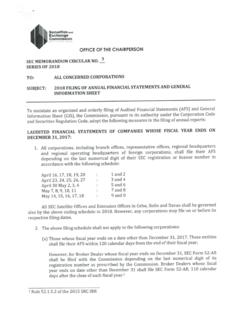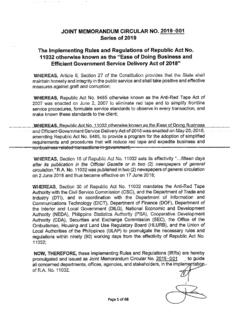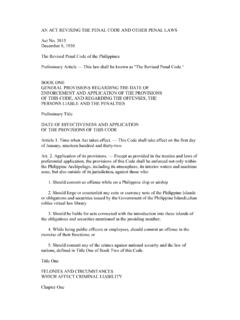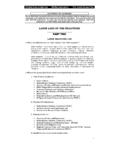Transcription of Republic of the Philippines SECURITIES AND EXCHANGE ...
1 Republic of the Philippines SECURITIES AND EXCHANGE commission SEC building , EDSA, greenhills mandaluyong city SEC Memorandum Circular No. 6 Series of 2009 REVISED CODE OF CORPORATE GOVERNANCE Pursuant to its mandate under the SECURITIES Regulation Code and the Corporation Code, the SECURITIES and EXCHANGE commission (the commission ), in a meeting held on June 18, 2009, approved the promulgation of this Revised Code of Corporate Governance (the Code ) which shall apply to registered corporations and to branches or subsidiaries of foreign corporations operating in the Philippines that (a) sell equity and/or debt SECURITIES to the public that are required to be registered with the commission , or (b)
2 Have assets in excess of Fifty Million Pesos and at least two hundred (200) stockholders who own at least one hundred (100) shares each of equity SECURITIES , or (c) whose equity SECURITIES are listed on an EXCHANGE ; or (d) are grantees of secondary licenses from the commission . Article 1: Definition of Terms a) Corporate Governance the framework of rules, systems and processes in the corporation that governs the performance by the Board of Directors and Management of their respective duties and responsibilities to the stockholders; b) Board of Directors the governing body elected by the stockholders that exercises the corporate powers of a corporation, conducts all its business and controls its properties.
3 C) EXCHANGE an organized market place or facility that brings together buyers and sellers, and executes trades of SECURITIES and/or commodities; d) Management the body given the authority by the Board of Directors to implement the policies it has laid down in the conduct of the business of the corporation; e) Independent director a person who, apart from his fees and shareholdings, is independent of management and free from any business or other relationship which could, or could reasonably be perceived to, materially interfere with his exercise of independent judgment in carrying out his responsibilities as a director; f) Executive director a director who is also the head of a department or unit of the corporation or performs any work related to its operation.
4 G) Non-executive director a director who is not the head of a department or unit of the corporation nor performs any work related to its operation; 2 h) Non-audit work the other services offered by an external auditor to a corporation that are not directly related and relevant to its statutory audit functions, such as, accounting, payroll, bookkeeping, reconciliation, computer project management, data processing, or information technology outsourcing services, internal audit, and other services that may compromise the independence and objectivity of an external auditor.
5 I) Internal control the system established by the Board of Directors and Management for the accomplishment of the corporation s objectives, the efficient operation of its business, the reliability of its financial reporting, and faithful compliance with applicable laws, regulations and internal rules; j) Internal control system the framework under which internal controls are developed and implemented (alone or in concert with other policies or procedures) to manage and control a particular risk or business activity, or combination of risks or business activities, to which the corporation is exposed.
6 K) Internal audit an independent and objective assurance activity designed to add value to and improve the corporation s operations, and help it accomplish its objectives by providing a systematic and disciplined approach in the evaluation and improvement of the effectiveness of risk management, control and governance processes; l) Internal audit department a department or unit of the corporation and its consultants, if any, that provide independent and objective assurance services in order to add value to and improve the corporation s operations; m) Internal Auditor the highest position in the corporation responsible for internal audit activities.
7 If internal audit activities are performed by outside service providers, he is the person responsible for overseeing the service contract, the overall quality of these activities, and follow-up of engagement results. Article 2: Rules of Interpretation A) All references to the masculine gender in the salient provisions of this Code shall likewise cover the feminine gender. B) All doubts or questions that may arise in the interpretation or application of this Code shall be resolved in favor of promoting transparency, accountability and fairness to the stockholders and investors of the corporation.
8 Article 3: Board Governance The Board of Directors (the Board ) is primarily responsible for the governance of the corporation. Corollary to setting the policies for the accomplishment of the corporate objectives, it shall provide an independent check on Management. 3 A) Composition of the Board The Board shall be composed of at least five (5), but not more than fifteen (15), members who are elected by the stockholders. All companies covered by this Code shall have at least two (2) independent directors or such number of independent directors that constitutes twenty percent (20%) of the members of the Board, whichever is lesser, but in no case less than two (2).
9 All other companies are encouraged to have independent directors in their boards. The membership of the Board may be a combination of executive and non-executive directors (which include independent directors) in order that no director or small group of directors can dominate the decision-making process. The non-executive directors should possess such qualifications and stature that would enable them to effectively participate in the deliberations of the Board. B) Multiple Board Seats The Board may consider the adoption of guidelines on the number of directorships that its members can hold in stock and non-stock corporations.
10 The optimum number should take into consideration the capacity of a director to diligently and efficiently perform his duties and responsibilities. The Chief Executive Officer ( CEO ) and other executive directors may be covered by a lower indicative limit for membership in other boards. A similar limit may apply to independent or non-executive directors who, at the same time, serve as full-time executives in other corporations. In any case, the capacity of the directors to diligently and efficiently perform their duties and responsibilities to the boards they serve should not be compromised.


















